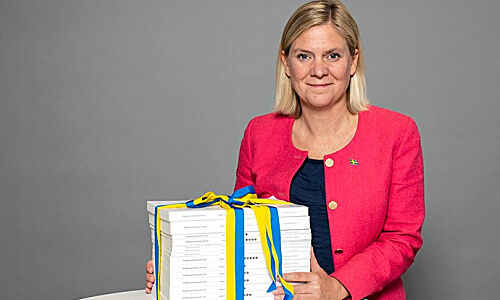The pandemic has given Sweden its unique health experiment. Today's budget presentation showed that the virus is also wreaking havoc with dearly-held political certainties.
At Monday's presentation of the Swedish state budget for 2021, Finance Minister Magdalena Andersson pronounced full of pride: «The social democratic heart is jumping for joy for such a redistribution profile.»
Sweden's strongest political party must have worked very hard on how it wanted to present the budget, because the Nordic country's Social Democrats have not for nothing been famous for happily enforcing huge tax rates on the country's citizenry – the equal distribution of money being at the heart of its ideology. Lower taxes for wage earners and companies wasn't really part of its narrative.
Economic Stimulus in Times of Crisis
For decades, the dominant political force of Sweden relied on a broadly based consensus within the country in favor of heavy redistribution measures. The consensus however started to give way when globalization took off for real and under the reign of Conservative Prime Minister Fredrik Reinfeldt (2006 through 2014).
And now, in times of corona-crisis, even a government led by the Social Democrats has to sell its citizens a budget that contains huge tax cuts to help stimulate the economy. The government hopes that the broad measures announced today, which are worth a total of 105 billion Swedish kroner ($11.9 billion), will create 75,000 news jobs, which in turn will generate more tax income – an example of classic economic stimulation. It helps of course having a comparatively low rate of public debt (about 42 percent of GDP).
Extra Spending for More Jobs
The reason behind the government's insistence on the job market is the surge in unemployment that was caused by the pandemic and despite the government's relatively hands-off approach to containing the spread of the virus. Sweden in August had an unemployment rate of 8.8 percent, or a total of 493,500, which is a third higher than a year ago.
For a successful and thriving economy such as Sweden's, this rate of unemployment is fairly elevated. The jobless rate in Switzerland has also exploded as a consequence of the crisis, but the plus of 50 percent year-on-year resulted in a rate of «only» 3.3 percent (Swiss government statistic for August 2020).
Is It All Too Much?
But despite the jobless woes, Sweden can boast its low public debt rates, which helps the government argue in favor of extra spending in times of crisis. Whether the stimulus is actually going to help the country emerge from the crisis is hotly disputed. The economics experts for major banks have already criticized the size of the stimulus.
Annika Winsth, chief economist at Nordea, told the Swedish state television channel «SVT» that the recovery was underway in any case and that it was unnecessary to spend such an amount of money. The 105 billion kroner was a lot of taxpayers' money, she argued, and the government ought to consider well how it spent that money.
The Budget of a Minority Coalition Government
The budget clearly is one of a broad coalition that has to reflect many interests. The Social Democrats today are far from being able to govern alone or with the support of one small party (as they did for decades). After the elections of 2018, Prime Minister Stefan Loefven had to buy the support of the Center and the Liberal parties to get the minority coalition with the Greens installed (in a political landscape upset by the surge of far-right populist support, which left both established blocks unable to form their own majority governments).
Ironically, the two support parties, who aren't themselves members of the coalition, presented the tax cuts contained in next year's budget already on September 10, boasting their success in the discussions with the left-leaning cabinet. It showed how strong their influence can be and it also suggests that the jump for joy by the Social Democrats finance minister may have been one for the gallery.






























